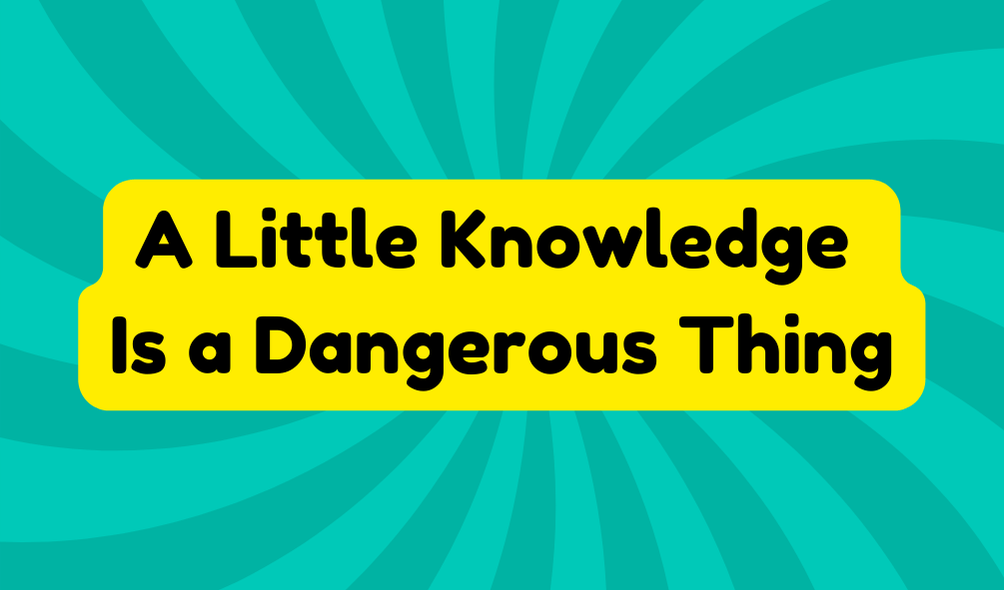The phrase “a little knowledge is a dangerous thing” warns against acting on superficial understanding. It suggests that limited expertise often leads to poor decisions, whether in technology, finance, or everyday situations. For instance, a novice in electronics may cause more harm than good. This saying emphasizes the importance of thorough comprehension to avoid significant errors. Recognizing these risks encourages individuals to seek deeper insights, which can be vital in an information-heavy world where making informed choices is essential.
Synonyms
The phrase “A little knowledge is a dangerous thing” can be expressed through several synonyms and variations that reflect similar cautions about incomplete understanding. Recognizing knowledge pitfalls prioritizes cautious learning, encouraging individuals to avoid the traps of premature confidence. This imperative is echoed in various expressions, such as:
- “A small amount of understanding can mislead.”
- “Limited knowledge can lead to misguided actions.”
- “Surface-level learning invites serious errors.”
Each of these variations emphasizes the significance of thorough comprehension, demonstrating that superficial insights can yield undesirable consequences. In the pursuit of innovation, deeper exploration remains essential.
Example of Sentences
Recognizing the potential missteps that arise from limited knowledge invites an examination of practical examples illustrating this point. Consider these scenarios:
- A novice attempting to repair electronics may create more damage due to a surface level understanding.
- Someone with basic cooking skills might experiment with complex recipes, resulting in disaster.
- A person who reads just a few articles on investing could make poor financial choices without a deep understanding.
These examples reveal that superficial knowledge can lead to significant errors, highlighting the necessity for thorough learning before taking action and emphasizing the importance of expertise over mere familiarity.
Origin
Originating from the intertwining threads of literary and philosophical discourse, the phrase “A little knowledge is a dangerous thing” traces its roots back to the early 18th century. Widely attributed to Alexander Pope in 1709, he originally penned, “A little learning is a dangerous thing.” However, historical misconceptions suggest earlier variations existed, particularly an anonymous formulation from 1698. Additionally, Francis Bacon’s reflections on knowledge predate these instances, hinting at a deeper semantic evolution. Such attributions and misquotes demonstrate how collective understanding shifts over time, revealing society’s struggles with knowledge amid rising access to information during that transformative era.
Collocations
Collocations related to the concept of knowledge often reveal underlying attitudes and assumptions held in society. These combinations can lead to potential knowledge pitfalls and illustrate the need for cautious learning. For instance, individuals frequently encounter phrases such as:
- Superficial knowledge often misguides decision-making.
- Limited expertise can foster overconfidence.
- Incomplete understanding invites costly errors.
These collocations underscore a societal trend where surface-level comprehension is mistakenly equated with true expertise. The challenge lies in recognizing that opting for deeper learning is essential to avoid misunderstandings, thereby promoting a more informed and innovative approach to knowledge application in diverse contexts.
How to Use in Everyday Language
When individuals speak about knowledge in everyday conversations, they often incorporate the phrase “a little knowledge is a dangerous thing” to express caution about overconfidence. This expression serves as cautionary advice against acting on limited information without deeper understanding. In practical applications, particularly in fields like science or technology, it reminds people that partial knowledge can lead to significant errors. By highlighting the risks associated with superficial learning, the phrase encourages a commitment to thorough research and deliberation. Recognizing the limits of one’s knowledge fosters humility, which is essential in a world that increasingly values expertise and innovation.
Why Is It Still Relevant Today?
The phrase “a little knowledge is a dangerous thing” maintains its relevance in today’s fast-paced, information-rich society. As digital literacy skyrockets, individuals often gain snippets of information without the foundational understanding needed to apply it effectively. This superficial grasp can lead to misguided decisions and ill-informed opinions, highlighting the vital importance of critical thinking. In an age where misinformation spreads rapidly, it is essential for individuals to cultivate deeper knowledge rather than relying on surface-level insights. Consequently, the phrase serves as a timely reminder that true understanding demands thorough learning and cautious engagement with what one believes they know.







